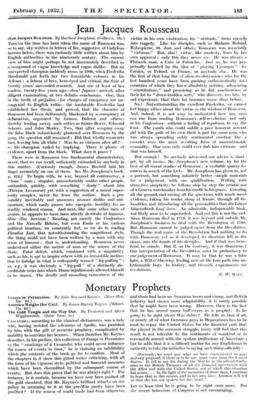Jean Jacques Rousseau
Jean Jacques Rousseau. By Matthew Josephson. (Gollanez. 18a.) Tnouou the time has been when the name of Rousseau was, so to say, sky-written in letters of fire, suggestive of Carlylean horrors below, there was curiously little written about him by English authorities in the nineteenth century. The current view of him might perhaps be not inaccurately described as a compound of vague knowledge and vague dislike. But an unexpected champion suddenly arose, in 1006, when Frederika Macdonald put forth her two formidable volumes in his defence : a labour of love, keen-eyed and critical, the fruit of flientY years' unwearied research. And one at least of her readers, twenty-five years ago—diets! fugaces—arrived, after diligent examination, at two definite conclusions. One, that in the teeth of prejudice—for charges of conspiracy are un- congenial to English critics— the irrefutable Feederika had established her thesis, and proved, that the character of Rousseau had been deliberately blackened by a conspiracy of defamation, organized by Grimm, Diderot_ and others : thereby leading astray such critics as Sainte-Bcuve, Edmond Scherer, and John Morley. Two, that after scraping away the false black industriously plastered over Rousseau by the gang, the question still remained Did that wholly exonerate him, leaving him all white ? Was he so virtuous after all ?-- as his 'champion ended by implying. There is plenty of evidence, apart from the black. What does it prove ?
There were in Rousseau two fundamental characteristics, never, that we can recall, sutliciently estimated by anybody in this matter. (Curiously enough, James Boswell laid his linger accurately on one of them. See Mr. Josephson's book, p. 424.) To begin with, he was, beyond all controversy, a " lone " man ; singular, uncomfortably unlike other people, outlandish, pricldy, with something " shady " about him (116rese Levasseur) yet with a suggestion of a moral super- iority complex, never far from the surface. Such a per- sonality inevitably and unawares arouses dislike and ant- agonism, which easily passes into energetic hostility, for no readily rendered reason. And next, like some other men of genius, be appears to have been utterly destitute of humour. Iliac iliac lacrinwe ! Reading, not merely the Confessions and the Nome& Heloise, but even Emile or his various political treatises, we constantly feel, as we do in reading Paradise Lost, that notwithstanding the magnificent style, the thing could not have been written by a man with any sense of humour : that is, understanding. . Rousseau never understood either the nature of man or the nature of the State. Fatal defect, which, combined with a singularity such as his, is apt to inspire others with an irresistible inclims- tion to indulge in what is colloquially termed " leg-pulling " as, e.g., it was obviously a " leg-pull " of a distinctly dis- creditable order into -which Hume injudiciously allowed himself to be drawn. The deadly and unsmiling earnestness of the victim in his own vindication, his "attitude," turns comedy into tragedy. Like his disciples, such as Madame Roland,- .Robespierre, St. Just and others, Rousseau was invariably "virtuous." But, alas ! virtue, like modesty, loses by her .own approval ; only this they never see. Ile was always it Plutarch man, a Cato or Fabricius. 'Just ao, he was per- petually haunted by the idea of "playing Lyeurgus "—fur Corsica, or Poland, or France, or anybody else, lie was the first of that long line of alien- revolutionaries who for the last hundred years have been pushing enthusiastically into
countries of which they knew absolutely notl advocating "constitutions," and promising, as he did, runcliomtion of their lot to "down-trodden serfs," who discover, too late, by sad' experience, that their lot becomes worse than before.
No! Notwithstanding the excellent Frederikm. we eamiot feel happy either about the virtue or the wisdom of Rousseau. And, indeed, it is not easy to understand how any man can rise from reading Rousseau's self-revelation—not only in his Confessions—without a feeling of repulsion, to say the least. The youth. who could saddle a poor innocent servant girl with the guilt of his own theft is just the, same man. who was always. spreading sickly sentimental emotion like a coverlet over the most revolting form of unmentionable sensuality. One man only could ever dub him virtuous --and that was himself.
But enough ! To anybody interested our whim: is short: get, by all means, Mr. Josephson's new volume, by far the best of all recent studies of Rousseau : a veritable quarry for miners in search of the facts. Mr. Josephson has given us, not it portrait, but something infinitely better—ample materials for a judgement, with one qualification. Writing with attractive simplicity, lie follows step by step the erratic Son of a Geneva watchmaker from his cradle to his grave. Covering all the ground, and raising all the questions, with much novel evidence, taking his reader along at leiSure,. through all the localities, 'and introducing all the personalities that des Lebens labyrinthisch Lan( irrcn. All admirable, indispensable book, not likely soon to be superseded. And yet this is not the end. Since Rousseau died in 1778, it was beyond and outside Mr. Josephson's business to deal with the Revolution of 1789. But Rousseau cannot be judged apart from the Revolution. Though the real cause of the Revolution had nothing to do with Rousseau, yet as it developed, its direction fell, in the chaos, into the hands of his disciples. And if that was bene- ficial, he stands. But if, on the contrary, it was disastrous ? Our interpretation of the Revolution must be preliminary to our judgement of Rousseau. It may be that he was a false light, a Will-o'-the-wisp, leading men off the -true path into un- fathomable bogs. In history. said Disraeli,. experiments are revolutions.
F. W. 13.,a st.








































 Previous page
Previous page